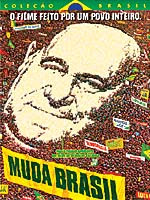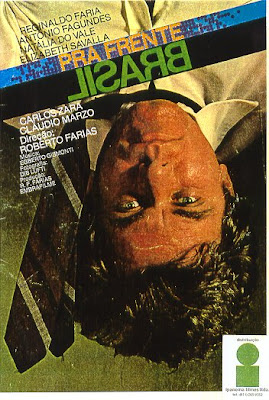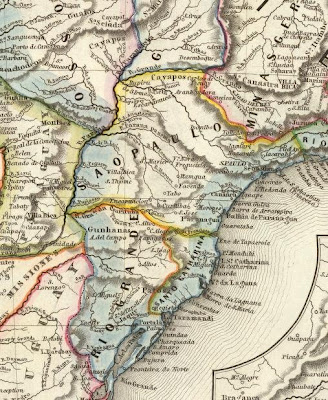CINEMA E POLÍTICA NO BRASIL: 141 filmes políticos nacionais em 68 anos


A política não aparece como meio para ampliar liberdades ou como bem público, aparece antes como meio de dominação, e em larga medida, como dominação ilegítima e violenta.
O objetivo desta pesquisa é compreender qual é o acervo audiovisual que o Brasil acumulou sobre política nacional, quais temas políticos foram preferidos, e como foram abordados pelos cineastas. É claro que nem todas essas questões podem ser respondidas nessa fase das análises, em especial por que não sei quantos filmes mais podem existir. Continuo a busca. Depois que publiquei a primeira versão da lista, recebi vários e-mails com sugestões, e continuei a investigar, o que ampliou a lista de 121 para os atuais 141 filmes, e ampliou uma categoria. Acredito, entretanto, depois de seis meses buscando informações, que a esta altura a relação seja bastante representativa da filmografia política brasileira.
Minha preocupação, neste primeiro momento, não foi classificar os filmes pelo tempo de duração (curta ou longa metragem), nem pelas definições usuais de ficção, documentários, animação, experimentação, ou pelo gênero (comédia, drama, aventura, ação). Há outras formas de classificar, ainda. Mas não me pareceram úteis para os propósitos da pesquisa política. Daí a opção por uma categorização mais afim à teoria política do que à crítica cinematográfica.
Os temas preferidos dos diretores nacionais nesse período foram, pela ordem:
(1) a crítica ao regime autoritário de 1964-1984 (31 filmes), depois;
(2) as biografias políticas (22 filmes) e;
(4) Violência urbana, injustiça social, ausência de Estado (15 filmes).
Esses quatro amplos temas representam praticamente a metade de todos os filmes políticos já feitos nessas quase sete décadas.
O cinema político brasileiro olha, então, prioritariamente para a violência institucional de um período pós-1964, depois para os feitos de líderes e para as formas de violência armada com motivos políticos.
O tema predileto da cinematografia política brasileira, no entanto, tem sido a crítica ao autoritarismo. Representam praticamente um terço de todos os filmes. Se somarmos os filmes “críticos do autoritarismo” varguista e do regime de 1964, são 40 filmes. Mas esse número pode subir facilmente para 46 se for feita uma análise menos purista que a minha. “Lamarca”, por exemplo, é um filme que optei por classificar como biográfico, “O velho” e “O país dos Tenentes” também. Idem para “Os inconfidentes” e “Nada será como antes, nada?”. Enfim, como era de esperar, há filmes que podem estar em mais de uma categoria. Meu esforço, no entanto, foi de classificar o filme pelo seu objetivo principal. Lamarca, para mim, é uma biografia. O contexto do personagem é o da guerrilha, mas é a história de um personagem. Segui esse critério sempre que pude.
Esta não é uma filmografia que projeta elementos positivos da política nacional, não é um cinema político do elogio. Predominam em larga quantidade o "filme denúncia" de uma sociedade sem Estado, injusta e violenta. Há também "a guerra como política por outros meios", e abordagens sarcásticas em relação a práticas e costumes anti-republicanos e anti-democráticos dos políticos nacionais.
Em contrapartida, pouco se filmou a abertura democrática, os sonhos da geração dos anos 80, a reorganização partidária pós 1979 e líderes democráticos do Brasil. Há filmes sobre Teotônio Vilela e Tancredo Neves. Mas não sobre Ulisses Guimarães. Não se encontra nada sobre os republicanos do final do século XIX, nem sobre “os abolicionistas”. Há raros filmes sobre a Descoberta do Brasil e sobre a Independência, ainda feitos, lamentavelmente, no estilo “eu me ufano de meu país”, sem drama e poesia.
Quanto aos temas pouquissimo tratados, dá pra dizer que é insignificante a produção sobre as relações entre igreja e Estado, só há 4 filmes, e para isso devemos considerar um dos capítulos da excelente série Histórias do Poder e também temos de considerar a biografia de Dom Helder Câmara. Sobre instituições públicas (3 filmes) e sobre partidos políticos (1 filme). Não há nada sobre o processo constituinte de 1987 nem sobre a tremenda crise política de 1961 a 1963. É pena.
Parece haver uma preferência pela “revelação” da política como “guerra por outros meios”, do Brasil como uma “sociedade sem política” e da política como principalmente o resultado da “ação de líderes”.
É, sem dúvida, uma opção pelo realismo e pela denúncia direta, sem rodeios, com pouca inclinação para a esperança e para grandes sonhos civilizacionais. É pena. A arte pode ser mais do que denúncia, e o cinema, mais do que realismo.
Cinema é cultura.
Bons filmes.
Basta solicitar-me, pelo e-mail: strapazzon.carlos.luiz@gmail.com
[Versão em inglês]
I present here my personal list of 141 national movies [brazilian movies] that approach brazilian politics scenes and political subjects. Here we have 68 years of cinematographic production classified in 13 great areas.
It´s clear that the politics does not appears as a way to extend freedom or as a public good. It looks like, instead, as a form of domination; and I risk to affirm, as violent and illegitimate form of domination.
The objective of this research is to understand which is the audiovisual brazilian memory accumulated on national politics, which political themes had been preferred by directors, and how these artists had been looked the Brazilian political history. It is clear that nor all these questions can be answered in this phase of the analyzes, in special because I do not know how many films more exists. I continue my work. After I published the first version of this list, I received several e-mails from many parts of Brazil, and even from abroad, with many good suggestions. I thank everyone for this kindness. After this help the list grew up from 121 for current 141 films, and i had to extended one category. I believe, however, after one year searching information that this is a very representative list of the Brazilian politics cinema.
My concern at this first moment is not to classify the films for the time of duration (short or long duration), nor for the usual definitions in fiction, documentary, animation, experimentation, or for the sort (comedy, drama, adventure, action). It has even other forms to classify. This formo f classification did not seemed useful for the intentions of the political research. That´s because my option for a classification more similar to the political theory than the cinema critic.
The preferred subjects of the national directors in this 68 last years had been, by order:
(1) the critical movie to the authoritarian political regime of 1964-1984 (31 films);
(2) the political biographies (22 films);
(3) the wars in which Brazil was involved, armed local rebellions or armed local conflicts with political reasons (22 films);
(4) urban violence, social injustice, absence of state (15 films).
These four ample subjects surely represent practically the half of all political films made in these seven decades in Brazil. So, we can say that the brazilian politic cinema looks first to the institucional violence of a period after-1964, after, to the personal history of the political leaders and after to the forms of violence seted with political reasons.
The favorite subject of the brazilian political cinematography has been the critical to the authoritarianism. These films represent practically a third part of all. If we add the critical films to Getulio Vargas Presidential dictature, we have 40 films. But this number can go up easily for 46 if we have an analysis less purist than mine. "Lamarca", for example, is a film that I opted to classify as biographical; "O Velho" and "O país dos Tenentes", i did the same. Idem for "Os inconfidentes" and "Nada será como antes, nada?". At last, as it was to wait, there are films that can be in more than one category. My effort, however, was to classify the film for its main objective. Lamarca, for me, is a biography. The context of the personage is a guerilla, right, but it is the history of a personage. I followed this criterion whenever I could.
This is not a filmography that projects positive elements of the national politics arena, it´s not a cinema of the compliment. What we see is directors very concentraded to make a public denuntiation of a society without State, unfair, violent and opressive. In one word, it´s a political realism, a cinema that assume the politic, in these past years, as a hobbesian kind of war "by others ways"; it´s too a sarcastic look to the cotidian public practices and to the no republican and no democratic customs of the national political elite.
On the other hand, few directors filmed the 80´s democratic opening, the dreams of the generation of the 80´s, the partisan reorganization after 1979 and democratic leaders. It hás, that´s true, some films on Teotônio Vilela and Tancredo Neves. But nothing on Ulisses Guimarães, for example. There´s nothing about the republicans of the end of 19th century, nor on "the abolitionists". There are rare films on the Brazilian discovery and on Independence moment, but in a very poor style "I boast of my country"; no drama, no poetry.
In relation to these subjects not much filmed, we may affirm that the production is insignificant on the relations between church and State - only four films - and for this we must consider one of the chapters of the excellent serie "Histories of the Power" and also we have to consider the biography of Dom Helder Camara. On public institutions - three films - and on political parties - 1 film. There´s nothing about the tremendous 1963 crisis of transition, nor to the constituent process of 1987 or about the President Collor impeachment. It´s a shame.
It seems to exist a preference to revelate the politics as "war for other ways", an intention to describe Brazil as a "society without politics" and the politics as the result of the "action of leaders", some times as tyrannous, some times as heros. Is that sofisticate or it is a market strategy?
It is, without a doubt, an option for the realism and to the direct denunciation, without roundups, with little inclination for the hope and great civilizacional dreams. It´s a shame.
In my poor point of view, the art can be more than denunciation, and the good cinema, more than realism.
I hope good films to you.
I offer to the interested a complete list that informs NAME OF the FILM, SUMMARY, DIRECTION, YEAR OF LAUNCHING, DURATION, MAIN CAST of all the films of this blog.
But, unhappyly --- sorry --- they are in portuguese.


Comentários
Parabéns.
Kelly
Estarei acrescentando em breve as informações passadas por ti. O blog fica aberto para novas informações que acrescentem sobre teu estudo.
Abraços, parabéns pela iniciativa.
Yerko Herrera.
www.musicapoesiabrasileira.blogspot.com
Também preciso elogiar sua sensibilidade para as imagens. Não só nesse post, mas nos demais da página nós vemos cartazes, desenhos, fotos que vão além da informação. A preocupação estética valoriza seu trabalho!
Parabéns.